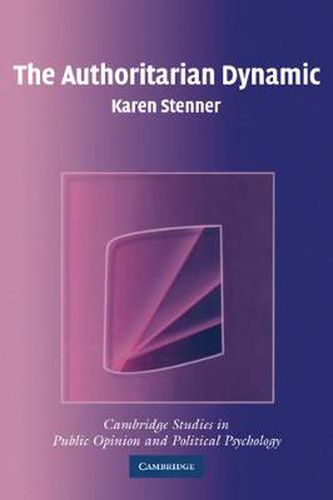Readings Newsletter
Become a Readings Member to make your shopping experience even easier.
Sign in or sign up for free!
You’re not far away from qualifying for FREE standard shipping within Australia
You’ve qualified for FREE standard shipping within Australia
The cart is loading…






What is the basis for intolerance? This book addresses that question by developing a universal theory about what causes intolerance of difference in general, which includes racism, political intolerance (e.g. restriction of free speech), moral intolerance (e.g. homophobia, supporting censorship, opposing abortion) and punitiveness. It demonstrates that all these seemingly disparate attitudes are principally caused by just two factors: individuals’ innate psychological predispositions to intolerance (‘authoritarianism’) interacting with changing conditions of societal threat. The threatening conditions, resonant particularly in the present political climate, that exacerbate authoritarian attitudes include national economic downturn, rapidly rising crime rates, civil dissent and unrest, loss of confidence in social institutions, presidential unpopularity, divisive presidential campaigns, and internal or external crises that undermine national pride or confidence. Using purpose-built experimental manipulations, cross-national survey data and in-depth personal interviews with extreme authoritarians, the book shows that this simple model provides the most complete account of intolerance.
$9.00 standard shipping within Australia
FREE standard shipping within Australia for orders over $100.00
Express & International shipping calculated at checkout
What is the basis for intolerance? This book addresses that question by developing a universal theory about what causes intolerance of difference in general, which includes racism, political intolerance (e.g. restriction of free speech), moral intolerance (e.g. homophobia, supporting censorship, opposing abortion) and punitiveness. It demonstrates that all these seemingly disparate attitudes are principally caused by just two factors: individuals’ innate psychological predispositions to intolerance (‘authoritarianism’) interacting with changing conditions of societal threat. The threatening conditions, resonant particularly in the present political climate, that exacerbate authoritarian attitudes include national economic downturn, rapidly rising crime rates, civil dissent and unrest, loss of confidence in social institutions, presidential unpopularity, divisive presidential campaigns, and internal or external crises that undermine national pride or confidence. Using purpose-built experimental manipulations, cross-national survey data and in-depth personal interviews with extreme authoritarians, the book shows that this simple model provides the most complete account of intolerance.